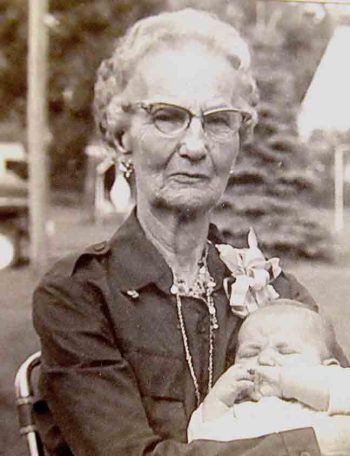
Part three of a series
During the Great Depression decade of the 1930s, families were often large while money and employment were scarce. The United States government purchased relief food, clothing and supplies and gave it to the Red Cross for distribution to those in need. Flour was the primary food staple with other foodstuff added when possible.
The distribution center in Spring Grove was the home of Mathilda (Mrs. Knute) Lee, who at age 49, had been appointed Houston County Roll chairman of the 1932 Red Cross membership drive. When people would come to the door at times when her mom was away, one of Mathilda’s daughters knew what to do. Mathilda’s son, Robert E. A. (Bob) Lee, an award-winning movie and television producer, reflected, “The whole enterprise not only took over our

Photo submitted
dining room as a storage area. It took over much of our daily life and left a deep and lasting impression on each of us.”
Her daughter Margaret looked back, “All I remember was that our dining room had big boxes of grapefruit and maybe oranges. They were beautiful, the top of the line. And we never had any grapefruit that looked like that. And believe me, we never tasted one of those. We had a dining room that looked like a warehouse part of the time.”
Daughter Juliet recalled, “Our dining room was converted into a regular store… there was flour there, lots of fabric, lots of stockings and food like oranges. Oh, let’s see, what else? Clothing, children’s clothing, and then people would come and she would dispense this stuff. And she had to keep records of everything she gave away… Mother was meticulous in her screening of applicants. Also, she had too much pride to accept any provisions for her own family.”
Mathilda had provided for her family table by securing the use of a large plot in Spring Grove where she planted a garden. She and her children worked many hours in the garden while husband and businessman Knute had traded for a cow and arranged for pasturing near town. Although times were tough for the Lee family as well, Mathilda never took anything from the Red Cross provisions, intended for those even less fortunate.
Daughter Naomi remembered, “All I know was that during that time, we had all kinds of stuff stored at our house: sugar, flour, oranges, all kinds of things. All people had to do was come and sign a paper, and she kept track of what was doled out and we could not touch it… I could almost tell you the size of the piece of paper they had to sign – like half a typewriter sheet – and it was a government form.”
Mathilda’s son Bill related, “I drove her around the county, around Houston County, delivering flour sacks and bales of overalls and clothing to some of the most critical, needy families. I drove around in the old 1928 coupe, and I remember coming to one farm on a cold, bitter October day when it wasn’t snowing, but the ground was frozen. The farmer’s children were running barefooted across that frozen dirt. It was tough.”
In Mathilda’s handwriting, “I think I was allowed to use my own discretion. They told me their wants, you know. I know Nels Viker was the mayor then, and he blamed me for giving a sack of flour to someone he thought didn’t need it. I think that was the only time I was criticized for that. What are you going to do when a woman comes in with a tale of woe? I suppose Nels Vikert was a rich man and had never been in need, while I knew what it meant. I didn’t have any bad conscience!”
Son Bob concluded, ”The experience with relief supplies to families suddenly finding themselves pinched by the Depression and out of cash was profoundly moving for our entire household. Mathilda summed it up when she wrote, “The Red Cross is more than distribution. It is in the business of repairing bruised lives and homes.” And on another page of her notes, “The American Red Cross is the greatest mother in the world!” (“And I would have to add,” wrote Bob, “It takes one to know one!”)
According to son Bob, Mathilda’s performance as County Roll Call Chairman led to her subsequent promotion to “what had been considered by almost everyone then as a ‘man-sized’ job – succeeding Mr. Blexrud first and then Dr. Lovold as chair of the Houston County chapter of the American Red Cross.”
Bob believed his mother’s endeavors with the Red Cross was “almost therapeutic” for her and the entire family. “It helped mitigate any temptation to self-pity over the austerity forced on us and millions of others by the dire economic straits of that period.”
Clara Mathilda Glasrud Lee (1883-1978) died from an injury 15 days before her 95th birthday.
Source: “Mathilda’s Journey” by Robert E. A. Lee, published in 2000


Gary Paul Glasrud says
Thanks, Lee. .Mathilda was my dad Paul Glasrud’s aunt. The writings here are heartwarming, I remember her from my years in Spring Grove and at family gatherings but was unaware of her strength and love for everyone! We too often forget the tough times our relatives endured and this is a good lesson for us all. Again, thanks.
Mark Skustad says
Thank you for writing the story. Matilda was my grandmother and the baby was my second child. Grandma didn’t have much patience for children that behave. But she loved each and every one of us. She set a pretty high standard for us to live up to. Thanks again.